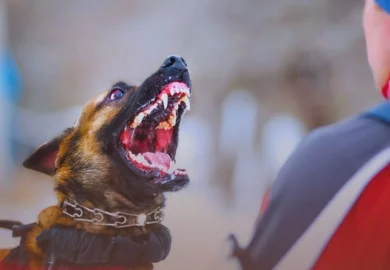Dog bites can leave victims suffering with serious physical and emotional injuries. When dangerous dogs attack, those injured may have a right to seek compensation for their associated losses. To do so, however, they will need to determine liability – whether that falls to the dog’s owner or another party.
Table of Contents

If you have been injured due to a dog attack, do not waste time contacting our Illinois personal injury lawyer to aid you with pursuing damages.
What Is a Dangerous Dog?
Dangerous dog is a designation the state may give animals in Illinois that meet the criteria for such a determination. Dogs can be deemed dangerous if they bite someone without cause. Dogs can also be deemed dangerous if they behave in a way that a reasonable person would consider a threat to themselves, another person, or an animal while unleashed, without a muzzle, and unattended anywhere other than the dog owner’s property.
If located, two dogs in the Belleville area may be determined dangerous after an attack on a local man. While walking his children’s dogs, two unleashed and unattended dogs attacked the smaller animals. The unattended dogs knocked the man to the ground, also attacking him. He suffered serious wounds to his legs.
In Illinois, the determination of a dog as dangerous begins with a complaint or incident report – notifying the authorities of the perceived threat posed by the animal or an attack that has occurred. An appointed veterinarian, the director of the Illinois Department of Agriculture, or an agent of the director will investigate the allegations or incident, and decide if the dog meets the aforementioned criteria. If so, the owner will receive notice of the determination.
Owners’ Responsibilities for Dangerous Dogs
If the state determines an animal is dangerous, Illinois dog owners have several responsibilities. Dangerous dog owners must register their animals with the Illinois Department of Agriculture within 14 days of the determination. If they are not already, dog owners must also have their pets microchipped.
Additionally, after a dangerous dog determination, owners must ensure their pets are kept securely confined within their property. They are also required to post warning signs at their property entrance, and to maintain liability insurance. If dangerous dogs are taken off the property by owners, they must be leashed and muzzled. Therefore, the owners of the dogs who attacked the man in Belleville, once located, will have to take precautions to ensure they cannot escape their yard and pose a risk to others again.
In some cases, the state may require dogs deemed dangerous to undergo obedience or behavior modification training. The court may sometimes impose additional orders regarding the restriction or management of dangerous dogs.
Why Do Dogs Attack?
Dog attacks rarely occur unprovoked. Rather, there are several factors that may contribute to a dog attacking another canine or a person. Such factors include:
Protection or Guarding
Although domesticated, dogs can still be territorial when it comes to resources, such as the property or the areas they are in, food, and toys. Protection or guarding can exhibit in aggressive behavior, such as biting.
Fear
Dogs, like people, can feel fear. If they become afraid, concerned, or are startled, it can cause them to behave defensively. Among other behaviors, defensiveness may cause dogs to bite.
Pain
Experiencing pain or discomfort can be overwhelming for dogs. As a result, they may react defensively, even to someone familiar to them, and bite or attack.
Frustration
Boredom, confinement, an inability to reach something they want, and other factors can result in dogs becoming frustrated. Due to frustration, they may act destructively, which can manifest as aggression and biting.
Common Dog Attack Injuries
When dogs attack, they can cause ranging injuries. The harm they cause varies from minor to severe, or in some cases, fatal. The wife of the man who was attacked in Belleville noted that emergency room staff told her a child would not have survived the dog bites her husband suffered. Some of the most common injuries suffered in dog attacks include:
Soft Tissue Damage
The dog’s bite and physical impact during attacks may cause soft tissue damage. Such injuries may include, bruises, strains and sprains, and nerve damage.
Puncture Wounds
During an attack, a dog’s teeth often puncture the skin, tearing through the underlying tissue. Consequently, victims may suffer open wounds that require stitches.
Lacerations and Tears
Lacerations and tears are similar to puncture wounds, but typically span across larger areas. Such injuries may result from biting and tearing during a dog attack.
Fractures
Due to the force of the bites, or because they get knocked to the ground, victims in dog attacks may suffer fractures. Broken bones in the hands, arms, legs, and facial bones commonly result from such incidents.
Psychological Trauma
Dog attacks don’t just leave physical wounds, they can also cause psychological trauma. Victims commonly experience emotional distress, anxiety, fear, and post-traumatic stress disorder from such incidents.
Infections
Because of the bacteria in their mouths and other such factors, dog bite injuries can easily lead to infections that require antibiotics.
The types and severity of injury that victims suffer in dog attack varies. If you suffer dog bite injuries, you should seek medical attention to assess the seriousness and ensure you receive proper treatment. Having records of such treatment will prove necessary if you choose to file a dog bite lawsuit against the owner.
Who Can Be Held Responsible for an Animal Attack in Illinois?
Responsibility for animal attacks in Illinois often falls to the dog’s owner. A dog owner includes anyone who has ownership rights to the dog, cares for the dog, or acts as its custodian. Additionally, those who knowingly allow a dog to remain on their property, or otherwise harbor or keep the dog, can also be considered dog owners.
In addition to dog owners, landlords and daycares or kennels may also be held responsible for animal attacks. Landlords can have some liability if they knew about the dog’s aggressiveness and did not take reasonable measures to protect others. Doggie daycares and kennels have a duty to properly restrain and supervise dogs. Therefore, if an animal attacks while in the care of such a facility, the owner or operator may be held financially responsible for the resulting injuries.
Determining Liability for Dangerous Dog Attacks
Liability for dangerous dog attacks in Illinois involves several factors. Under state law, strict liability makes dog owners financially responsible for injuries caused by their pets. Therefore, you may not have to prove that the dog previously displayed aggressive behavior to hold the owners liable.
In dog bite cases, your burden of proof to recover compensation includes showing the defendant is the dog owner. Further, you must show the owner’s negligence allowed the dog to attack you, and prove the dog attacked you and caused injuries. Additionally, a dog bite lawyer will help you prove that you suffered losses as a result of your injuries.
Exceptions exist under which the owner may not have liability for dog bite injuries. If you were not behaving peacefully at the time you were attacked, the dog’s owner may have limited or no responsibility. For instance, if you were threatening or attempting to steal from the owner when the dog attack happened, it may affect the dog owner’s liability for your injuries.
Provoking the dog in some way can also effect liability. The pet owner may not be financially responsible if you were trespassing, acting aggressively toward the owner, or intentionally causing the dog harm when the attack occurred.
Recovering Damages for Dog Bite Injuries in Illinois
If you suffer injuries in a dog attack, you may pursue a civil action against the responsible party to recover compensation. The types of personal injury damages you can recover for a dog attack in Illinois include economic and non-economic losses.
Economic Damages
The economic damages you can recover in a dog bite lawsuit include monetary losses resulting from the attack. For example, you may pursue compensation for your associated medical bills, lost income, lost future income, home modifications, lost benefits, and other such costs.
Non-Economic Damages
In addition to compensation for the monetary losses resulting from the attack, you can recover damages for less-tangible losses. The non-economic damages for which you can seek compensation include:
- Pain and suffering
- Disfigurement
- Loss of enjoyment of life
- Pain and suffering
- Loss of reputation
All dog owners have a responsibility to manage their pets. However, those who keep dogs deemed dangerous by the state have an even greater duty. Therefore, if they fail to restrict animals they know to pose a hazard, victims may seek to hold them financially liable for their resulting losses. Consulting with an attorney can help victims understand their options, and answer questions, such as “How long does a personal injury lawsuit take?” and “How much can I expect to recover for my injuries?” If you were attacked by a dog and suffered injuries, contact Ankin Law today to discuss holding the dog owner liable and how you can recover the compensation you deserve.



